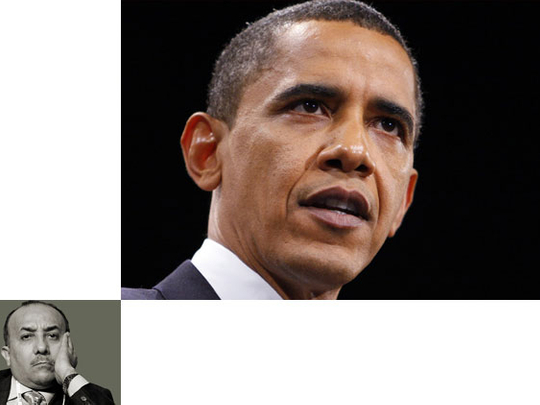
In my last article titled ‘Showing a sincerity of purpose’ (Gulf News, February 4), I argued that there is a need for US President Barack Obama to come up with a genuine initiative in his second term to move the Middle East peace process towards that lofty goal of a two-state solution. That failure, along with the ad hoc handling of the forces of change in the republics of the Arab Spring, sank Obama’s strategy in the Middle East and the Muslim world, which he had earlier addressed in a conciliatory tone from Cairo.
When it comes to this region, Obama’s first term record was mixed at best. Clearly, the US was absent at the controls, distracted by and pre-occupied in the past two years by the economic crisis and its impact on US voters and by the long and bruising election season that lasted over a year.
Obama did withdraw US troops from Iraq, but look at that country today; it is a powder keg waiting to explode. Obama has since resisted getting entangled in the Middle East’s vicious web. He left Syria burning and didn’t do anything about the atrocities and massacres being perpetrated by a thuggish regime that forced his predecessors like George W. Bush — as in the case of Kuwait — and Bill Clinton — Serbia — to intervene.
The Obama administration’s handling of the Syrian debacle is abysmal, to put it mildly. It is ironic that after 70,000 were killed in Syria, after extremist elements associated with Al Qaida established a foothold there, and despite fears about Syria’s stockpile of chemical and biological weapons falling in the wrong hands and Russia upping the ante in Syria, the Obama administration has not led the international community to do anything about the Bashar Al Assad regime.
All those challenges have not convinced the US administration to arm selected elements of the Syrian opposition. It emerged during a hearing in the US Senate that the White House had vetoed former secretary of state Hillary Clinton and former secretary of defence Leon Panetta along with the chairman of the Joint Chiefs of Staff Martin Dempsey who “supported a plan last year to arm carefully vetted Syrian rebels”.
As the New York Times put it, “In his first term, President Obama presided over an administration known for its lack of open dissension on critical foreign policy issues.” It seems Syria has put an end to that. Not even Russia’s exploitation of the Syrian crisis through nasty methods reminiscent of the Cold War era pushed the US to get more involved in Syria.
In Libya, the US led from behind. In Mali, it let the French fight Al Qaida. The US has continued to struggle with Iran over its nuclear programme and is preparing to withdraw from Afghanistan. Obama is dubbed by some US analysts as the “drone president” for overplaying his hand in his counter-terrorism strategy in the region.
Relying too heavily on drone attacks in Afghanistan, Pakistan, Yemen and Somalia is not a lasting strategy. But there have not been any major achievements, initiatives or even a clear doctrine that could be attributed to Obama’s presidency.
As he settles into his second term with his new national security team (Chuck Hagel, as nominee for secretary of defence, is facing an uphill battle against his fellow Republicans in the US Senate) many rough issues and countries are looming large as spoilers for his final term in office.
There is North Korea, with its brazen third nuclear test, and Iran with its continued defiance and daring uranium enrichment and the departing President Mahmoud Ahmadinejad declaring pre-emptively and triumphantly that it is over … Iran is now a nuclear power.
Syria continues to be a festering wound as its bloody and heart-wrenching revolution approaches its second anniversary. The international community faces a moral dilemma as the average number of daily causalities exceeds a hundred innocent civilians.
Afghanistan is another pressing issue that could test Obama’s second term record. In his State of the Union address, Obama touched upon all these flashpoints. On Afghanistan, the overarching issue is “leaving” by 2014 and paving the way for that objective. Gone are days when Afghanistan had become Obama’s war after the surge he ordered in 2009.
US presidents in their second terms in office tend to look forward to establishing a lasting legacy because they are free from the constraints of re-election and getting entangled in crises and scandals. Nevertheless, when it comes to Obama’s search for a lasting legacy, I find myself in agreement with Aaron David Miller, the seasoned US diplomat who played a key role in the Middle East peace process and who is currently a distinguished scholar at the Woodrow Wilson International Centre for Scholars.
He opined in a piece last week in Foreign Policy, entitled ‘The Avoider’, that “Obama’s State of the Union address makes one thing clear: The world is no longer America’s problem.” Because, as Miller put it, what will make or break Obama’s presidency is “his domestic legacy”. And “it is the middle class in the US that matters and not the Middle East ...” which is “violent, and volatile and may yet suck him in, but if he can avoid it, he’ll try ... The future of America is not Cairo and Damascus; it is Chicago and Detroit...”
So shall we resign ourselves to writing off Obama getting involved in the Middle East? What about America’s strategic interests and its worried allies in the Middle East and emboldened foes watching its retreat? The Obama administration, instead of fighting its foes and adversaries comprising state and non-state actors is content to fight for healthcare and immigration reforms domestically. If this comes to pass, then forget drawing up a visionary strategy and bold initiatives or forming a doctrine and leaving behind a legacy.
Professor Abdullah Al Shayji is the chairman of the political science department, Kuwait University. You can follow him on Twitter at www.twitter.com/docshayji









